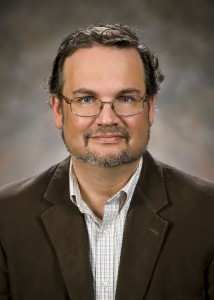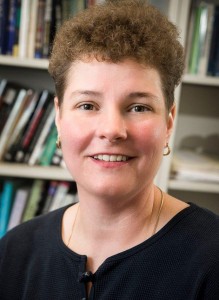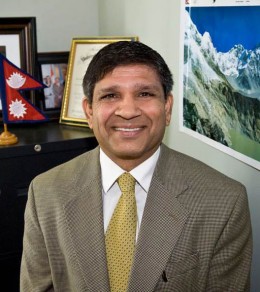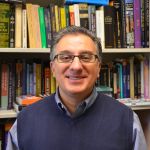
Paul Lockhart, professor of history and the Brage Golding Distinguished Professor of Research, will discuss “Dayton in the Great War: Scholarship, Community, and What We Mean by ‘Popular History’” at the College of Liberal Arts Research Conference.
Wright State College of Liberal Arts (COLA) faculty members who took Professional Development Leave (PDL) from 2013 to 2014 to conduct research will participate in a research conference, speaking on various topics from a Prophet Moses Festival in Jerusalem to musical theatre to Dayton during World War I.
The conference will be held in the Creative Arts Center’s Schuster Hall from 10:30 a.m. to 4 p.m. Monday, on Feb. 9. A reception will follow at 4 p.m. in the Robert and Elaine Stein Galleries in the Creative Arts Center. The conference is open to the public.
Paul Lockhart, professor of history and the Brage Golding Distinguished Professor of Research, will be a keynote speaker.
“COLA is very excited about showcasing the diverse research activities that faculty engage in across the college,” said Kristin Sobolik, dean of the College of Liberal Arts.

Sociology professor Karen Lahm will discuss “Women Inmates: An Exploration of Misconduct and Victimization Behind Bars.”
Lockhart said that he was honored and humbled to be chosen as the conference’s distinguished speaker. “Being chosen to give the final talk is a pretty big honor, given the accomplishments of my colleagues here at Wright State, and I’m pretty happy about that,” he said.
Wright State’s Ohio Center of Excellence in Collaborative Education, Leadership and Innovation in the Arts (CELIA), Lockhart put together a team to commemorate the centennial of the start of World War I. Over the next few years, he will work on an exhibit at Carillon Historical Park and a documentary film about Dayton in the war.
“The idea with both of these latter projects is to look at how WWI changed the United States, how much it transformed the nation, by looking at how it changed life so drastically here in the Miami Valley,” Lockhart said.
He has published four books about Scandinavian history and two books on the American Revolution. He has completed in-depth research in at least a dozen archives in Denmark, Norway, Sweden, Germany and other places.
Lockhart knows the importance of reaching a non-academic crowd.
“I think it’s important that academic historians write specialized books and articles for other historians, but I think it’s equally important — and noble, too, in a way — for historians to reach out beyond the university environment to the rest of the world, to make history relevant for regular folks,” he said.
Awad Halabi, associate professor of history, studied abroad to further his research.
“I mostly conducted research at the main Islamic archive in Jerusalem searching for documents that relate to my study about an Islamic festival in honor of the Prophet Moses. Muslims honor Moses as a prophet and believe he is buried at a tomb and shrine near Jericho. The documents I collected discuss the pre-WWI, late-Ottoman era (1850-1914) celebrations and how they were organized,” said Halabi.
Halabi said he has studied the festival for years, but because of teaching commitments, could not attend until this previous year.
At the conference, he will showcase pictures and videos he took in Jerusalem when he observed the Prophet Moses Festival.
Karen Lahm, associate professor of sociology, will discuss “Women Inmates: An Exploration of Misconduct and Victimization Behind Bars.” Lahm has spent her career studying prisons and their populations. Her most recent research project is looking at female inmate misconduct — physical violence, sexual violence, verbal altercations and property victimization.

Political science professor Pramod Kantha will discuss “Nepal’s Complex Political Transition and Peace Process: Understanding the Interaction Between Internal and External Forces.”
Pramod Kantha, associate professor of political science, will discuss “Nepal’s Complex Political Transition and Peace Process: Understanding the Interaction Between Internal and External Forces.” A native of Nepal, Kantha has conducted extensive research for a book on the country’s transition from a monarchy to a democratic republic.
Richard Bullock, assistant chair and professor of English language and literature and director of writing programs, will present “Teaching to Help Students Develop Academic Habits of Mind.”
“I will be discussing student habits of mind and how faculty can help college students succeed in college and why faculty should be helping students develop the tools they need to succeed in college,” he said.
Other speakers include: Tracey Steele, associate professor and chair of sociology and anthropology; Sarah Twill, chair and professor of social work; and Joe Deer, professor of musical theatre and director of the Musical Theatre Initiative at Wright State.
PDLs are granted to faculty to conduct in-depth research. COLA’s Research Conference will allow faculty to discuss their research and what they have accomplished during that time.
“Faculty, staff, students, and community members will be interested in attending this conference to learn more about the fantastic research that is going on here at Wright State University,” Sobolik said.
The conference is a way for Wright State faculty to showcase their research, learn more about their colleague’s scholarship interests, and interact with the community. It also allows students to realize that faculty members are scholars not just inside the university, but also on a national and international level.
“I think it’s very cool that we get to hear about research from outside of our own narrow research fields,” Lockhart said.
Halabi agrees. “I think it is great that COLA hosts these events so we can learn about the research our colleagues are doing,” he said. “My research certainly impacts my teaching. … I have the opportunity to teach about subjects … in a more personal way. … I value the opportunities I have to bring these insights into the classroom.”
More information on the research conference is available on the COLA website.


 Glowing grad
Glowing grad  Wright State’s Homecoming Week features block party-inspired events Feb. 4–7 on the Dayton Campus
Wright State’s Homecoming Week features block party-inspired events Feb. 4–7 on the Dayton Campus  Wright State music professor honored with Ohio’s top music education service award
Wright State music professor honored with Ohio’s top music education service award  Wright State’s Industrial and Human Factors Engineering program named one of top online graduate programs by U.S. News
Wright State’s Industrial and Human Factors Engineering program named one of top online graduate programs by U.S. News  Student-run ReyRey Café celebrates decade of entrepreneurship at Wright State
Student-run ReyRey Café celebrates decade of entrepreneurship at Wright State 